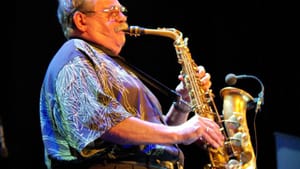Stay in the Loop
BSR publishes on a weekly schedule, with an email newsletter every Wednesday and Thursday morning. There’s no paywall, and subscribing is always free.
Phil Woods: An appreciation

Alto saxophonist Phil Woods, keeper of the bebop flame and one of the last surviving descendants of the Charlie “Yardbird” Parker school of playing, has died at the age of 83. He played his last job, a performance of material from famed “Charlie Parker with Strings” recordings, in Pittsburgh in early September, where he announced his retirement from playing.
In a remarkable without-compromise career that spanned six decades, he was nominated for seven Grammy Awards, winning four; was awarded the Jazz Master award from the National Endowment for the Arts; and managed to reach the non-jazz audience via his solo on Billy Joel’s “Just the Way You Are.”
A resident of the Delaware Water Gap since 1972 and a frequent visitor to this region, there wasn’t a jazz giant Woods didn’t work with. Over the years he worked with everyone from Buddy Rich and Quincy Jones to Dizzy Gillespie and Billie Holiday, but since 1974 he was best known as a leader of a quartet that often included drummer Bill Goodwin, bassist Steve Gilmore, and more recently, pianist Jim McNeely.
Like fellow alto saxophonists Cannonball Adderley, Sonny Criss, and Sonny Stitt, Woods fell under the spell of Charlie Parker early on, during his four years of study at Juilliard, where he graduated in 1952 with a major in clarinet and minor in composition. Upon the release of his first recordings in 1954, he was hailed as “The New Bird.”
Humor and versatility
But Woods was much more than a Parker imitator. A technical marvel and a hard swinger at heart, he combined intellect with a singular sense of humor and tremendous versatility, continuing to evolve stylistically until the end. He had no hesitation in playing with singers and instrumentalists from all schools of jazz, from traditional to avant garde, without losing his identity. That doesn’t often happen in jazz — at least not successfully.
Phil Woods was heavily involved in jazz education — he mentored our area’s Richie Cole, just to name one — and did everything he could to bring his music to as wide an audience as possible, even if it meant taking a chance.
Getting to the Point
In 1979, I was hired by the legendary Bryn Mawr folk club and coffeehouse, The Main Point, to do booking and publicity. By then, the Point had seen better days. The club couldn’t compete with clubs with liquor licenses like the Bijou Café, and the few folk artists who could draw crowds were, by then, not affordable. In the Point’s heyday in the 1960s, the club had some success with jazz acts, so I suggested we try that.
Phil Woods had a name among general audiences since “Just the Way You Are” had just won a Grammy, so I was pretty sure he would do well for us, and in the process, perhaps open the door for other jazz bookings. I called him at his home in the Water Gap, asked if the quartet had an open weekend down the line, emphasized that the Main Point was mainly known as a folk club, and asked him for a break on money, at least the first time out.
He was gung ho and brought the group down to Bryn Mawr about a month later. He sold out four shows that weekend, was the subject of much local press, and did indeed open the door to a slew of national and regional jazz bookings at the venerable Main Point.
I’ve always believed that only a guy like Phil Woods could do that. He will be missed.
Sign up for our newsletter
All of the week's new articles, all in one place. Sign up for the free weekly BSR newsletters, and don't miss a conversation.
 Bruce Klauber
Bruce Klauber